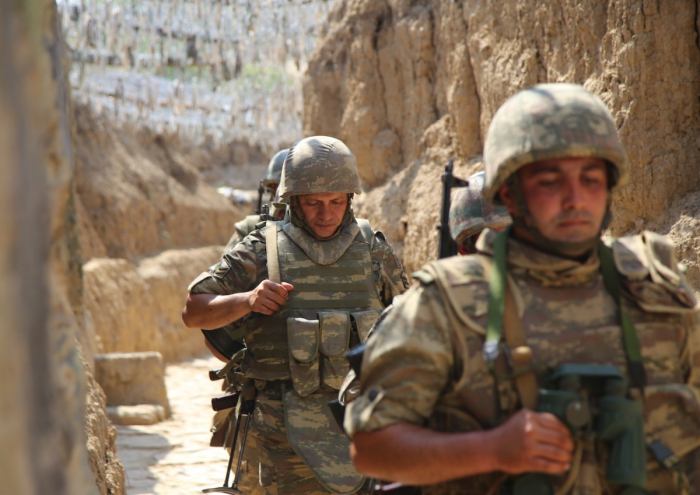While Europe and the rest of the world is trying to cope with the coronavirus and searching for ways to re-energise their pandemic-affected economies, fighting broke out on 12 July on the border between Armenia and Azerbaijan. Armenia would appear by any rational analysis to have the only motive for starting the recent border skirmishes, writes James Wilson.
The fighting, with heavy artillery fire, was concentrated in a border zone some 300 km to the north of Nagorno-Karabakh resulting in 20 casualties, both military and civilian.
The EU has urged both sides to stop the armed confrontation, refrain from action and rhetoric that provoke tension, and undertake immediate measures to prevent further escalation.
They have called both countries to devote energy and resources to fighting the coronavirus pandemic and meaningfully re-engage in substantive negotiations under the auspices of the OSCE Minsk Group Co-Chairs.
There has been sporadic violence across the line of contact between these two “arch-enemies” for years, following the collapse of the former Soviet Union. Both countries are amongst the most heavily militarised in the world.
Armenia and Azerbaijan have long been in a state of conflict over Nagorno-Karabakh, a territory which is internationally recognised as belonging to Azerbaijan but is currently under Armenian occupation.
The last major clashes in Nagorno-Karabakh erupted in April 2016 with significant advances and strategic gains by Azerbaijani armed forces. Armenia, having relied on Russia (which has a base in Armenia) and the Russian-led Collective Security Treaty Organisation (CSTO), was surprised to discover that the military backing of Russia and the CSTO did not extend to Nagorno-Karabakh.
This time around both sides blame the other for starting hostilities and have traded accusations about shelling civilians.
But Armenia would appear by any rational analysis to have the only motive for starting the border skirmishes this time. It has been the post-Soviet nation hardest hit by the pandemic: with reportedly over 30,000 infection cases and more than 500 deaths, as of mid-July.
The country declared a state of emergency in March, and since then economic activity has collapsed, businesses have closed and unemployment has spiralled.
There has been an estimated decline in GDP of between 2-3.5%, and the Armenian health system is now clearly at the limit of its capacity to deal with the crisis. Prime Minister Nikol Pashinyan has been severely criticised by the opposition for ineffective crisis management and failing to tackle the pandemic.
The situation has shattered the position of Armenia’s post-revolution government and destroyed the optimistic sentiment on which Nikol Pashinyan was elected in 2018. His critics say that Pashinyan needs a border provocation with Azerbaijan, to deflect public criticism of his handling of the pandemic.
“Rally round the flag” is always an effective tool for ruling circles during periods of international crisis or war, to mobilise the population and change the agenda.
This time, however, the provocation seems to have been planned well in advance. The border between Armenia and Azerbaijan, and not the frozen conflict zone of Nagorno-Karabakh, was chosen for starting the conflict.
Armenia’s renewed national security strategy, adopted on July 10 also put an emphasis on its alliance with Russia and members of the CSTO. In other words, a relevant reminder on collective security was sent to the Kremlin a couple of days before the skirmish.
From a military point of view, Azerbaijan`s north-western provinces might have also seemed an easy target to the Armenian military. The Azerbaijani side had been restructuring its military units and facilities in this area since 2018 as part of a deliberate policy of demilitarising this area, and the border services have replaced more experienced armed forces.
Aware of these significant changes across the border, the Armenian side was hoping in this blitzkrieg to advance into Azerbaijan`s territory and to occupy new territories.
This new tactic is also in line with the Armenian Minister of Defence David Tonoyan’s publicly announced strategic doctrine of “New war for new territories”, which he declared “will rid Armenia of this trench condition, the constant defensive state, and will add the units which may shift the military actions to the territory of the enemy”.
Another reason for choosing this specific region as a battleground is the key infrastructures passing in the vicinity. Built and developed by Azerbaijan over the past two decades, the Baku-Tbilisi-Ceyhan oil pipeline, Baku-Tbilisi-Erzurum gas pipeline, and Baku-Tbilisi-Kars railway form a critical energy and transport corridor between Europe and Asia.
They bear geopolitical significance as critical transport and energy infrastructure As a country, which has been left out of such important projects due to its hostile policies toward Azerbaijan and Turkey, Armenia threatens to target this infrastructure in order to exert economic and political pressure.
These border skirmishes which Azerbaijan assert have been initiated by Armenia may yet escalate into a full-scale war and could further develop into a major geopolitical confrontation. There have been massive demonstrations in Baku calling on the Parliament to mobilise troops for outright war against Armenia.
A rational analysis of the situation points to the likely motives that have pushed Armenia into triggering these clashes. Despite his democratic image and calls for peace, Pashinyan has cold-bloodedly planned to provoke this military incident: diverting the population’s attention from his failure to handle the COVID-19 crisis and resultant economic problems, occupying “new favourable positions” in Azerbaijani territory, and dragging the CSTO into conflict with Azerbaijan.
It is important for the EU to step up its diplomacy in the Caucasus, broker a lasting peace and halt the carpetbagging opportunism of Pashinyan which threatens to plunge the region into a war that will benefit nobody.
James Wilson is the founding director of the International Foundation for Better Governance www.better-governance.org.
Read the original article on euractiv.com.
More about: Armenia
















































